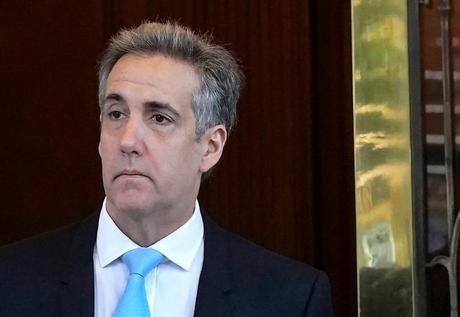Michael Cohen is asking the Supreme Court to revive his case against Donald Trump, who is accused of violating his former lawyer's constitutional rights by holding him in solitary confinement after he revealed plans for a tell-all memoir.
A challenge stemming from a lawsuit by the former "fixer" - who recently testified against Trump at his New York hush-hush trial - questions whether a president and federal officials can be held accountable for retaliating against their critics.
"No president should ever use the Justice Department as a weapon through a willing and complicit attorney general to unconstitutionally send a citizen to prison, in my case solitary confinement, because that person refuses to waive that constitutional right under the First Amendment," Cohen said. The independent on Wednesday.
"The actions of Donald J Trump and his administration are un-American, and I believe this case is ripe for hearing by the Supreme Court of the United States," he said.
The case comes on the heels of a shocking Supreme Court ruling that upheld a president's "absolute" immunity from criminal prosecution for "official" acts in office, radically expanding the reach of executive power.
A decision that could embolden Trump in a possible second term "has occurred to me," Cohen said, "although I don't believe anyone could justify this egregious, unconstitutional act as one ... who could get immunity under this ruling on presidential immunity."
A case examining government retaliation would give the Supreme Court a chance to decide whether the United States "is a democratic republic and not an autocracy led by a monarch, a dictator, a ruler, a supreme leader or a fuhrer," Cohen said.

In January, a panel of federal appeals court judges said they would not revive Cohen's lawsuit after it was dismissed by a lower court.
Cohen filed his appeal Wednesday with the nation's highest court, saying the case raises serious questions about the federal government's violations of the Constitution against its fiercest critics.
"The questions raised in this petition are of the utmost importance," Cohen's attorney, Jon-Michael Dougherty, wrote in a letter to the court.
"The possibility that the federal government has the power to retaliate against critics with prison sentences, with no consequences or checks on the officials who engage in such retaliation, is a chilling prospect," Dougherty added. "This Court should not avert its eyes from this profound violation of the contract between a limited government and a free citizenry."
The case cites Supreme Court case law that allows defendants to sue federal officials for constitutional violations. Such cases are supposed to deter officials from retaliating against citizens.
Cohen was sentenced to prison in 2018 after pleading guilty to tax evasion, campaign finance charges and lying to Congress, allegedly at the behest of his former boss.
After being released in 2020 and placed on house arrest to prevent the spread of Covid-19, Cohen revealed his plans for a book about Trump.
Weeks later, and nearly four years ago, on the date of his Supreme Court appeal, Cohen was returned to prison and sent to solitary confinement. Prison officials had accused him of violating restrictions on his public communications.
He was reportedly ordered to sign an agreement banning him from contacting the media, including through print media.
Cohen and his lawyers wondered whether the "tailor-made" conditions of his release could be withdrawn.
Instead, he was "handcuffed and transported" back to a federal prison in Otisville, New York, and held in solitary confinement nearly 24 hours a day - "alone in a cell with poor ventilation, no air conditioning and a broken window," his complaint said.
In July 2020, after 16 days in solitary confinement and following a judge's intervention, Cohen was released and sent home.
The federal judge who ordered his release said his transfer back to prison was clearly "retaliation" in response to Cohen's plans to "exercise his First Amendment rights to publish a book critical of the president and to discuss the book on social media."
Cohen sued Trump, his attorney general, Bill Barr, and prison officials, alleging that his imprisonment violated his Fourth and Eighth Amendment rights against unreasonable seizure and cruel and unusual punishment.
In 2022, U.S. District Judge Lewis Liman granted the government's request to dismiss the case, but noted that he was concerned about the "profound violence" his order could have on Cohen's constitutional rights, indicating the issue should be resolved by the higher court.
"The Supreme Court's precedents ensure that there is at best a partial remedy for the abuse of power and violation of rights of the perpetrators of this injustice," Judge Liman wrote.
He suggested that there should be a "proper investigation" into whether the framers of the Constitution "intended that such a solution would come about."
"There are strong reasons to believe that in many cases the answer to that question will be yes," he added. "If someone's rights are violated by executive officials, the courts provide a legal remedy for that violation."
Trump's 2024 campaign has been fueled by the idea of "retaliation" for "those who were wronged and betrayed." His allies and the architects of a second Trump administration have vowed to prosecute his rivals.
The former president continued to attack Cohen as a "liar" during his criminal trial in Manhattan, where Cohen's damning four days of testimony led jurors through dozens of pages of evidence, including every one of the falsified corporate records at the heart of the case.
Trump's trial also revealed that Cohen was subject to a "pressure campaign" by allies of then-President Trump to gain his loyalty while he was under federal investigation.
